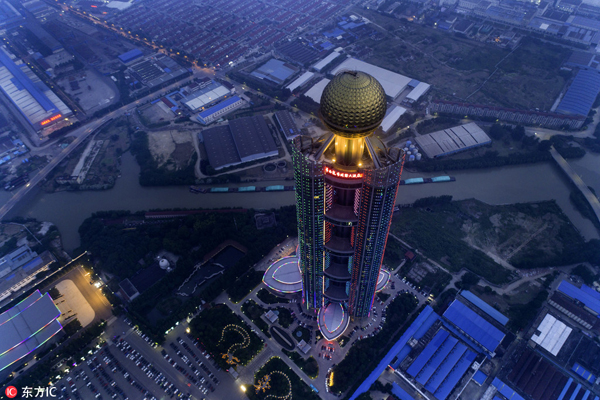Govt-enterprise cooperation boosts Wuxi's reform and opening-up

Huaxi village, located in Jiangyin city, Wuxi, Jiangsu province, is well-known for its success in opening up and realizing common prosperity. [Photo/IC]
Huaxi village, located in Jiangyin city, Wuxi, Jiangsu province, has been called the top village in the country. It is also a name card of Wuxi, known for its success in opening up and realizing common prosperity.
The name "Huaxi" is well-known for it is not only famous as one of the richest villages in China, and also brings to mind the Jiangsu Huaxi Group Corp, a company specialized in diversified operations with total assets of over 50 billion yuan ($7.32 billion).
Steel and chemical fibers used to be two of the group's primary focuses. Wu Xie'en, the son of Huaxi village's former Party secretary Wu Renbao, was elected as the village's new Party secretary as well as the president of Huaxi Group in 2003. Since then Wu has been striving to reshape the group's economic structure, upgrading the industry-dominant economy toward a modern service industry-led model.
Wu was confident about the transformation as he saw the trending changes in China's economy.
Firstly, with the adjustment of economic structure, large companies had to change to survive. "Expanding production of traditional industries will result in the increase of land prices and environment pollution. Developing new industries can hedge risks during the economic downturn," said Wu, who also served as a representative of both the 18th and 19th national congresses of the Communist Party of China.
Second, giant companies will gain high-quality and essential production factors, including capital and talent. Earlier the group had faced increasing difficulties for it was burdened by too much debt. According to statistics, Huaxi group's debt-asset ratio reached 69.4 percent by the end of September in 2017.
Wu treated moderate liability operations as an ideal way to optimize the distribution of resources and improve the Return on Equity (ROE) rate. In fact, a high liability ratio is not unusual for big enterprises. China Resources Group, one of the key state-owned enterprises in China, had an over 70 percent liability ratio in 2012.
Third, China's economic transformation provides large companies with opportunities to tap into the global market. Currently, Huaxi group enjoys a booming investment business, having set up an investment fund on high technology in Stanford University and invested in two mines in Mozambique. One Huaxi-invested chip companies now ranks among China's top 20 innovative companies.
"Huaxi pays great attention to investment security. For example, we are not deeply involved in the P2P business," Wu added.



